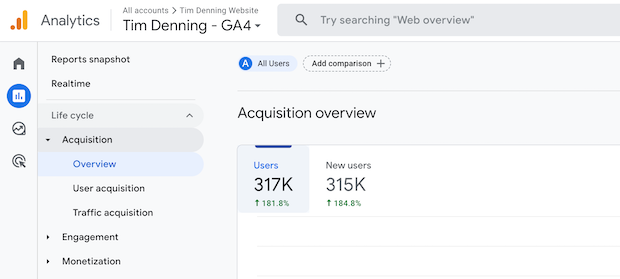Every writer talks about how social media is the holy grail.
I accidentally discovered it’s not. Over the last 90 days, my website has consistently got 100,000 + new readers a month (not views, READERS).

Screenshot of my website analytics
It’s a digital space I own 100% and can control the look and feel of. It’s led to record email subscriber growth and one of the highest-grossing revenue months for my online business.
Here are the ingredients you need to do the same.
It’s a long-term game
A personal website isn’t going to skyrocket your writing success overnight.
I’d be lying if I told you that. A website is a long game you start today and do in conjunction with social media.
It’s a digital asset you invest in that produces compounding returns over time if left to do its thing for long enough. I started my personal website 9 years ago. I got serious with it 2 years ago.
Now it’s got exponential growth that makes social media virality and millions of instagram followers look useless.
No SEO
SEO stands for Search Engine Optimization.
It’s the dark art of keywords and content strategy that fools google into thinking you’re an authority on a topic and artificially places your writing at the top of search results.
I’ve never understood SEO so I’ve never done it.
I did get a freelancer a while back to optimize my website a little for SEO but I’ve never proactively done SEO every week. If you know how it works then do it. If not, stick with these other techniques.
Publish a lot of content
That’s been the big difference on my website over the last 2 years. I’ve published hundreds of new articles that are mostly evergreen. When you go to the site it looks like a regularly updated and helpful resource.
Google’s algorithm definitely has an experience factor.
Websites that publish regular quality content over time will get an advantage. What stops it from occurring is most writers give up. They try it for 90 days then go “nope, this doesn’t work” and quit.
Lightning-fast web hosting
On your own website you have control of the hosting.
For about 7 years my website used to take 30-odd seconds to load. So readers just dropped off and didn’t stick around.
About 6 months ago I went down the rabbit hole of website hosting. I discovered that providers like WP Engine could help my site load faster.
So I invested in their hosting and my traffic suddenly began to rise much faster. I started on a 75,000 visits per month plan and quickly outgrew it.
This led me to hire a new web developer. I got WP Engine to recommend a freelancer for me. When I contacted him he told me he had his own private server within WP Engine so I canceled my plan and joined his.
This removed the limit on website visitors. It also gave my website even more speed because instead of being stuck on a server with 1000s of other websites, I joined a well-balanced server with a select few companies.
The bottom line is this:
- Readers love fast websites
- Google search engine loves fast websites
Make your website fast.
Easy to read on a phone
Most websites are full of junk and clutter.
18 months ago I got a smart web developer to redo my site. I made the layout as stupidly simple as possible.
I added a blog section, a popular article shortcut, a search field, and a few buttons with popular topics. Then I sorted all content by date.
Whenever anyone reads anything on their phone the text and line spacing is exactly right. I spent hours looking at my blog on different devices and getting it to look as good as possible.
Instead of huge walls of text, I wanted my articles to read like short text messages that feel easy to consume. This layout has helped keep readers on my site and also helped them return, according to my surveys.
Link to your website everywhere
The biggest problem with a personal website is nobody can find it.
That’s why writers turn to social media. But you can solve this problem over time. All I did was link to my personal website in every possible spot.
I linked to my site in articles on social media platforms, links in bios, in call-to-actions, in my weekly newsletter, etc. This built up the domain authority of my site slowly.
It told google “trusted websites link to this website.”
Now a lot of the traffic to my site is organic and doesn’t require ads.
Link to your website from another site with high domain authority
Publishing in old school publications like Forbes is for dinosaurs.
Their business models are getting lit on fire and their websites have more ads by the day. But there’s one good thing I did early on:
I published a few articles in major publications in return for them letting me link back to my personal website. They didn’t pay me for doing it or give me access to their audience.
But the links all these years later are worth their weight in gold.
The answer isn’t to go overboard and publish obsessively in Business Insider. Although a few articles on a couple of high-profile websites certainly helps build your own website.
A .com domain name
4 years ago I paid $7000 to get my full name with dot com at the end.
Friends and family thought I was nuts. They thought my ego had gone to my head. What they didn’t understand is .com domains have more authority. They seem more credible. They seem like the official source.
And a domain that’s easy to remember keeps readers coming back to read more. Too many people overlook the importance of a good domain name.
Oh, and SEO nerds tell me google ranks dot com domains as higher authority than say .net.
Longer form content always wins the fans
The trend is short-form content.
Silly 30-second TikToks, short tweets, 3-minute read essays. What’s missed is long-form builds writing careers. Long-form has depth that leads to real wisdom. And readers are starving for wisdom and exhausted by short, dopamine-driven writing.
When you publish on your personal website there’s no limit to your creativity or thoughts. And longer form content makes google search engine see you as more of an authority.
Many of my biggest hits on my site are 2000-word long essays.
It’s time to prioritize long-form again.
Simple WordPress
Since the birth of online blogs a lot of template website providers have popped up all promising fame and Mark Manson-style fortunes.
Yet WordPress still reigns supreme.
You simply can’t beat a basic WordPress website with a stripped out WordPress theme to be the engine of your content library.
Not too niche or you get bored
Gurus love to crap on about niches.
The problem with a super-tight niche is you get bored. I have more than one interest and don’t want to be limited creatively. My personal website has a few semi-related main topics and I hop between them as I please.
This gives readers multiple different angles to rethink life from. A friend once said to me “People are buying into your view of the world.” And your view of the world isn’t one-dimensional.
Don’t be afraid to write on your website about multiple different topics. This way of writing makes the niche your view of the world.
Time in the game beats strategizing about the game
I used to work for a marketing agency.
They sold websites to anyone who wanted one. I found it painful how clients would spend months designing their websites and thinking they knew everything about what people wanted.
I’ve found time in the writing game beats a clever strategy every time. You figure out your website strategy over time as you collect the data and see what topics, trends, and problems readers care about.
Become data-obsessed for a year or more to beat the competition.
Bringing it all together
I don’t have all the answers when it comes to websites.
I’m still figuring it out. What matters is you consider having a place on the internet that you own and send traffic to over time so one day you’re not reliant on Mark Fuckerberg or Papa Elon to give you their leftover scraps of traffic to pay your bills with.
A fast website that exists for a few years can do wonders for your writing career, if you’re patient enough and link to it everywhere you can.


